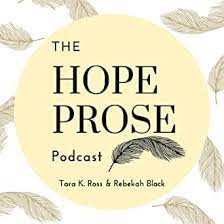Audiobooks are gaining popularity. I have always loved audiobooks and am a bit picky when it comes to narrators. Authors may not be aware of some pitfalls of producing narration. June is audiobook month, so I thought I’d have a chat with Tara K. Ross, narrator, YA author, and podcaster, asking about her experience.
How did you come to audiobook narration?
I’ve always loved reading aloud in any capacity, whether it be an animated rendition of my kid’s favorite stories, reading scripts in theatre auditions, or sharing a YA novel excerpt on the Hope Prose Podcast. Across all of these experiences, I was told that I had a knack for bringing stories and characters to life. With these words of encouragement, I began exploring what it would take to start narrating … and not just at bedtime.
What are some tips for those wanting to get into narration?
1. Practice reading aloud often, and learn how to scan ahead while reading.
2. Record yourself and get used to hearing your own voice.
3. Research recording equipment and ensure that you are willing to make the upfront investment in a good quality microphone, computer, and recording space.
4. Become familiar with editing software and good recording practices. As a beginning narrator, you will likely be responsible for editing and producing your own sound files. A great way to do this is by starting your own podcast!
5. Check out audiobook narrating sites like acx.com and findawayvoice.com
Did you run into any snags along the way?
Many! Learning to record and edit for audiobooks requires a greater level of attention than recording a podcast episode. My first few recordings were filled with distant dog barks and kids screaming, chair creaks, loud mouth sounds, and deep inhalations. I also needed to learn how to read and edit sound files. I have learned a ton through the ACX website and their acxuniversity.com .
Oftentimes, authors aren’t sure if they should narrate their own books or seek help. What makes a good narrator?
That is a great question. A good narrator will have enthusiasm and passion for the story, which all authors should have for their own stories, but good narrators also bring experience and acting skills to support that enthusiasm.
Some of my favorite audiobooks have been narrated by the author. However, those authors are often narrating their nonfiction books, where there is little need to switch between characters and exposition, or, in some cases, the author happens to have acting experience in their background.
If you are considering narrating your own book, try out your reading on others and see how they respond. Honest family and friends are great, but finding a few willing beta-listeners will be more revealing.
Authors also should keep in mind that narrating their own book will require a fairly substantial time commitment. The average 80,000-word audiobook will have a finished recording time of around ten to twelve hours. That’s finished recording time. Between recording, editing, and mastering, this time can triple! And sometimes, authors find that reading their novel and then having to listen to it in detail after years of editing is just too much. That’s when partnering with a narrator through sites like ACX and Findaway Voices might be the better option!
These are great tips! Thanks so much to Tara for sharing her insight with us.

Tara K. Ross is the author of the YA contemporary novel, Fade to White.
She narrated the recently released YA novel by Amy Michelle Carpenter, Becoming Human available on Audible or Amazon.com.
Listen to Tara’s Hope Prose podcast here

Donna Jo Stone writes YA contemporary novels about tough issues but always ends the stories with a note of hope. She blogs at donnajostone.com.




No Comments